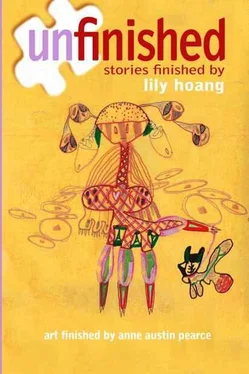Lily Hoang - Unfinished - stories finished by Lily Hoang
Здесь есть возможность читать онлайн «Lily Hoang - Unfinished - stories finished by Lily Hoang» весь текст электронной книги совершенно бесплатно (целиком полную версию без сокращений). В некоторых случаях можно слушать аудио, скачать через торрент в формате fb2 и присутствует краткое содержание. Издательство: Jaded Ibis Press, Жанр: Современная проза, на английском языке. Описание произведения, (предисловие) а так же отзывы посетителей доступны на портале библиотеки ЛибКат.
- Название:Unfinished: stories finished by Lily Hoang
- Автор:
- Издательство:Jaded Ibis Press
- Жанр:
- Год:неизвестен
- ISBN:нет данных
- Рейтинг книги:5 / 5. Голосов: 1
-
Избранное:Добавить в избранное
- Отзывы:
-
Ваша оценка:
- 100
- 1
- 2
- 3
- 4
- 5
Unfinished: stories finished by Lily Hoang: краткое содержание, описание и аннотация
Предлагаем к чтению аннотацию, описание, краткое содержание или предисловие (зависит от того, что написал сам автор книги «Unfinished: stories finished by Lily Hoang»). Если вы не нашли необходимую информацию о книге — напишите в комментариях, мы постараемся отыскать её.
Unfinished: stories finished by Lily Hoang — читать онлайн бесплатно полную книгу (весь текст) целиком
Ниже представлен текст книги, разбитый по страницам. Система сохранения места последней прочитанной страницы, позволяет с удобством читать онлайн бесплатно книгу «Unfinished: stories finished by Lily Hoang», без необходимости каждый раз заново искать на чём Вы остановились. Поставьте закладку, и сможете в любой момент перейти на страницу, на которой закончили чтение.
Интервал:
Закладка:
These eight senior women who moved into the brick farmhouse in September were wise. They chose the functional metal furniture and new synthetic fabric as a covering — which they would happily sew, pleat, stretch, stuff, and apply themselves — over pre-made, pre-upholstered furniture. They picked stainless steel instead of silver, aluminum pots and pans, a gas range over electric, an Amana refrigerator and a gas-powered Maytag washer and ringer. Each of the women wanted her own china pattern but together, they settled on an institutional setting. They scrimped on flatware.
Their professors called them conservative. Their professors called them wise and practical.
They kept their money for fresh foods.
They decided on one table-top radio, which they turned on for only one hour a day, late in the evening, for dancing or the news broadcast.
Though it would have brought them great pleasure, no porch swing. But a good broom.
And the best sewing machine available.
They had funds left over for emergencies. A good wife should always keep a special stash for emergencies, even if it means denying herself something she really wants. She won’t regret it when the time comes!
They waited for a few days to see if the weather would break, and when it didn’t, they bought a fan.
Their very first fight was over where to install it to best circulate the heavy air in their modest home. I wasn’t there for this yet.
That fall, a couple weeks into the start of the semester, two women from the State drove over from Nevada in an open car with a month old baby boy. The student who was responsible for entertainment served them tea and tea sandwiches while the women from the county talked about formula and the heat.
The student responsible for the baby in September sterilized bottles and nipples in their new kitchen. The silent fan in the front window drew air through the parlor. Everyone could smell the diapers boiling, the cucumber sandwiches, the damp baby souring in the heat. The women from the county nodded their heads at the new home, agreeing in unison about how pragmatic these girls were, not like some of the girls in the past.
This happened every fall: a new baby was driven to the college. In the spring, the baby went back to the county home and waited there to be adopted.
This group of eight girls was different. This was a pilot year: the girls were to stay in the practice house for the whole year, rather than the six weeks stint that previous Home Economics students were required.
After this year, the college would agree that the six weeks model was more ideal to mimic the model home experience.
I found out about this years and years later when I started looking for my real mother. I had my own daughter with me. Her name is Blanche, named after the woman I sometimes call Mother, the woman who ended up raising me — sometimes grudgingly — after I went back to the State home. She even paid for the detective when I expressed an interest in my past. The detective called me from Iowa and told me I had been one of those babies in the home management house. This is true. All of this is true. I don’t think I could’ve made it up if I wanted to.
First, they called it the State Agricultural College and Model Farm. Then: Iowa State Agricultural College. Then: Iowa State College of Agriculture and Mechanic Arts. That same year Khruschev visiting Iowa State, the college was renamed Iowa State University of Science and Technology. This is the name it retains today, although most people simply call it Iowa State University.
When did the shift in emphasis happen? Agriculture and Mechanic Arts to Science and Technology? Or are these the same things, under different guises?
The college — university now — still has a focus on Agriculture, but I suppose that’s inevitable if you live in Iowa, which I don’t.
Driving through with Blanche, I can hardly believe I ever lived here. This place, this whole damned state, feels like a movie: the kind of movie that makes you angry that you spent the time watching it. The kind of movie that you wish you could demand a time refund from. That’s how I feel about this whole state. And poor Blanche is sitting in the backseat, like we’re still out West, like we could belong here.
Although Blanche (the woman who raised me whom I sometimes call Mother, not my daughter) made it clear to me from a young age that I was adopted, she never told me my story before she picked me from orphanage. It’s possible that she wasn’t told, but now that this story is out, now that the detective told me I was one of those babies — a premium baby at any orphanage, really — it doesn’t make sense that Blanche wouldn’t have known.
Blanche is a quiet woman. She always has been, even when I was a baby. Well, really, I must’ve been toddler age by the time I got to her. My timeline has a bunch of holes in it, but at least it’s a skeleton of something or other. It’s enough to get me started, is all I’m saying. I was brought to the Richards House in 1959.
Back then, back when I lived there, it was called the Richards House. Before that, it called Duplex-C. Now, it’s called the Andrews-Richards House. It’s more massive than I’d imagined, not that I was given much time to give it thought, but it’s not what I thought it’d be like.
Now, it holds offices for professors. When Blanche tells me about the adoption, she explains that I was something of a prize. She tells me I was the baby everyone wanted most, but she was the one who got me. I was a source of pride — her winning me like I was a lottery jackpot — that she had no further need to adopt more babies or have any babies for herself.
Blanche tells me adoption becomes an addiction for her friends: they get one baby and before she knows it, they’ve got another, then another. And then, they have babies of their own.
Blanche tells me all this to differentiate our home from all these other women’s homes.
But I’ve never met these other women.
Not that I doubt Blanche or her ardent declarations.
Faulty though it can be, lottery aptly describes my adoption process.
Blanche may have explained how special I was when she adopted me, but she failed to mention why.
It’s possible she didn’t know.
It’s possible Blanche simply wanted me because other women wanted me and for no other reason than that.
We all want to be special.
The fields in Iowa are laid out like a newspaper in columns and blocks. The crops align like copy. Even the farm ponds are squared off. A picture of the blue sky — clouds at right angles — reflects on the still water, engraved with ripples like an old lead plate.
Together, Blanche and I drive down the white, dusty gutters, along the indentation of the folds. Folks here in Iowa must feel claustrophobic.
Truth is: I don’t know what we’re doing here. I don’t know what this will accomplish. When the detective first called me, I knew I had to see the Richards House but short of that, nothing. I have no plan.
Yesterday, as Blanche and I drove into Ames, she slept, her blanket securely against her face. I had to wake her, just to verify the gravity of our arrival, but she fell back asleep, the infinitely stretching walls of corn too mesmerizing to capture her attention.
When we toured the university, there was no mention of the Adams-Richards House, not until I specifically asked about it, and even then, my blockhead guide just dropped us off there without any historical note.
It was anti-climactic, our wandering through the halls of a building that could’ve been any other building on any college campus. To think I lived there for a year, that eight women cared for me like I was truly their baby for a year, and the blockhead guide didn’t care.
Читать дальшеИнтервал:
Закладка:
Похожие книги на «Unfinished: stories finished by Lily Hoang»
Представляем Вашему вниманию похожие книги на «Unfinished: stories finished by Lily Hoang» списком для выбора. Мы отобрали схожую по названию и смыслу литературу в надежде предоставить читателям больше вариантов отыскать новые, интересные, ещё непрочитанные произведения.
Обсуждение, отзывы о книге «Unfinished: stories finished by Lily Hoang» и просто собственные мнения читателей. Оставьте ваши комментарии, напишите, что Вы думаете о произведении, его смысле или главных героях. Укажите что конкретно понравилось, а что нет, и почему Вы так считаете.






![О Генри - Неоконченный рассказ [An Unfinished Story]](/books/415443/o-genri-neokonchennyj-rasskaz-an-unfinished-story-thumb.webp)





